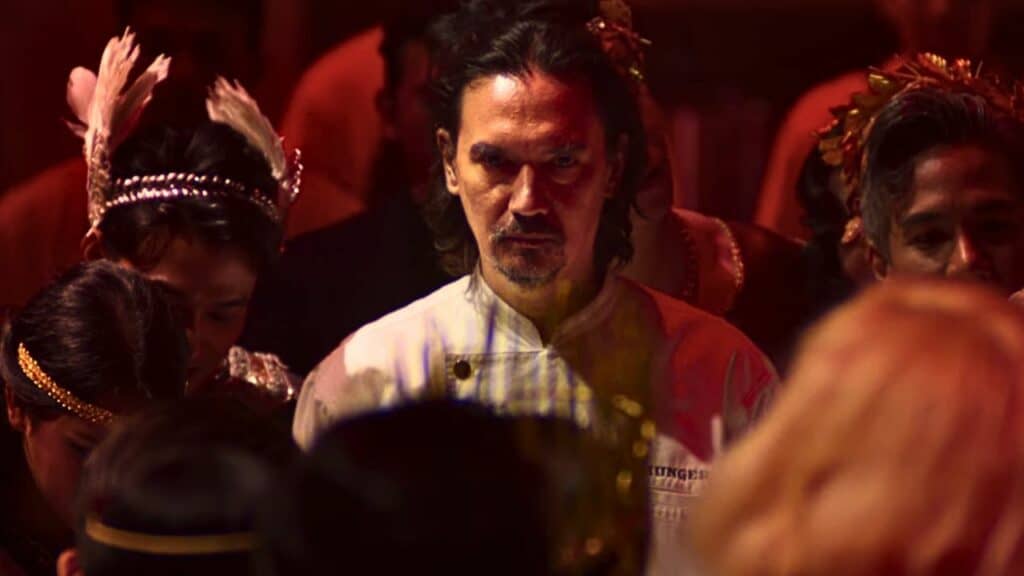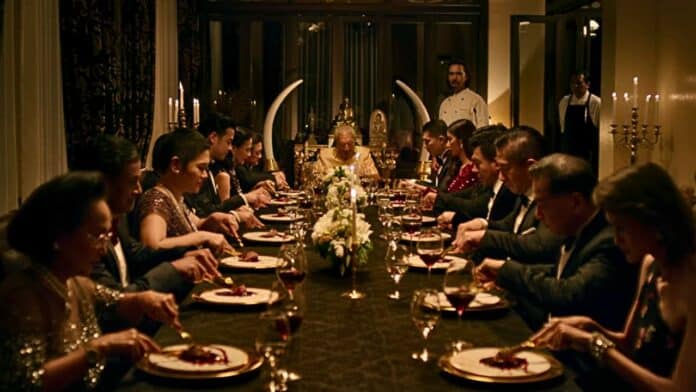Hunger is a Thai film that tells the story of two talented chefs with different lives who showcase their ambitions and teach the audience varying lessons.
Hunger is directed by Sitisiri Mongkolsiri and written by Kongdej Jaturanrasamee and analyses the term “hunger” on multiple levels with food used as the central theme to deliver its message. The film stars Chutimon Chuengcharoensukying and Nopachai Jayanama in lead roles.
The film very clearly depicts how the type of food one eats depends on their socio-economic status and one of Chef Paul’s dialogues states outright that the rich are always hungry for more and spare no cost to satiate that feeling.
The subject of class and prejudice
Chef Paul’s team caters to the fanciest events and anyone who can afford his exorbitant prices.
While they are serving a party of “crypto bros”, the other chefs observe how Chef Paul is being worshipped but the experienced sous chef Dang explains how they hired him for his name alone and lack the sophistication to truly appreciate the effort put into the food.
When a member of the team is caught stealing, he reasons that he’s worked there for many years so he deserves to eat well once in a while and Chef Paul tells him that if he wants that experience, he should pay for it just like the other clients.
Chef Paul is always focused on ensuring that the experience of eating his food is of the highest caliber and blocks out anything else. When they serve the family, he loses his mind after finding out that there was shrimp in the soup broth.
Knowing full well that the girl was deathly allergic to shrimp, he prepares a new broth so that they can have what they paid for. It is only later on that the audience learns that it was the family’s last meal as they died in a case of murder-suicide.
Multiple observations can be made from this. The parents of the family predetermined to carry out such a dreadful act but thought it significant to hire Chef Paul for their last meal.
Secondly, there is the question of Chef Paul’s knowledge of their plan and whether he willfully chose not to stop them because he only cares about whether people enjoy his food.
He later explains how an experience in his childhood drove him to become an excellent chef. His mother worked as a maid at a wealthy family’s house and he was extremely fascinated by a jar of caviar he noticed on their dining table.
He got his mother into trouble while trying to taste it and ultimately realized that it didn’t even taste that good. At that moment, he learned that rich people don’t care about taste, but rather the novelty and exclusivity of the food in front of him.
He decided then that he wanted to rise to a station where the people would come flocking to him to taste his food. He adds that poor people eat to survive while rich people have the means so they have no limits to their hunger.
At the final encounter between him and Aoy, he proves to her that his established name will always prevail over her innate talent and earnest efforts after the crowd is eventually in awe of his work.
This point is further driven home when Mr. Tos tells Aoy that he pulled many strings to get her invited to the event and not requested to come like she was told earlier.
Another film that has a similar theme is The Menu which satirizes the gimmicky nature of food consumption in the highest circles of society today that almost lies in the realm of ridiculousness.

Hunger for fame and fortune
When Aoy first checks out Chef Paul’s website, she sees that he offers chefs a chance to become someone truly special and she repeats that when he asks her why she wants to be a part of the team.
His approach to his team is very similar to that of Mr. Fletcher (J.K. Simmons) with his orchestra and especially Andrew (Miles Teller) in Whiplash. He aims for perfection, but his methods for achieving it are toxic and abusive.

However, Aoy’s determination to become a top chef is no different as she’s willing to bear the burns and stay in the kitchen the entire day to prove that she belongs in the team.
Even after showing some moral integrity by quitting the team because she refused to cook an exotic hornbill, she sees her demeanor become much like Chef Paul’s when she is in charge of her team at Flame.
Her former mentor visits her and points out that the obvious drawback of seeking fame is leaving behind the people close to her. He provides the example of Tone, the man who got her into this industry in the first place but couldn’t match her talent.
She feels this personally when she talks to her younger brother and he asks her to come back because they’ve spent far too much time together.
The film comments on how sometimes it can be exhausting and downright destructive to try and make a name for yourself in certain industries. Of course, here they are criticizing the specific choice to go down that pathway which isn’t the only option available.
Tone is another example of pride amongst humans as he tells Aoy that he can’t possibly work beneath her even though she offers him a great position and his venture seems to be failing. He lets that pride deprive him of a promising opportunity.
Chef Paul shows more of his arrogance while getting arrested, claiming that it will only draw more people to him because the rich will always want the most exotic meals and have no qualms about the moral or legal issues it raises.
Mr. Tos highlights another issue with fame and fortune which is how closely it is tied to physical appearance. He tells Aoy that she’ll have to meet with consultants to improve her image and promises her that it’s for her benefit.
Aoy, however, decides to leave that life behind and go back to her roots and make something of herself there, appreciating the simpler things in life.
Tone even tries to convince her that she has a hunger that he didn’t possess and he doesn’t regret bringing her into this life but she’s made her decision by that point.
Also Read: All the historical figures in Transatlantic

